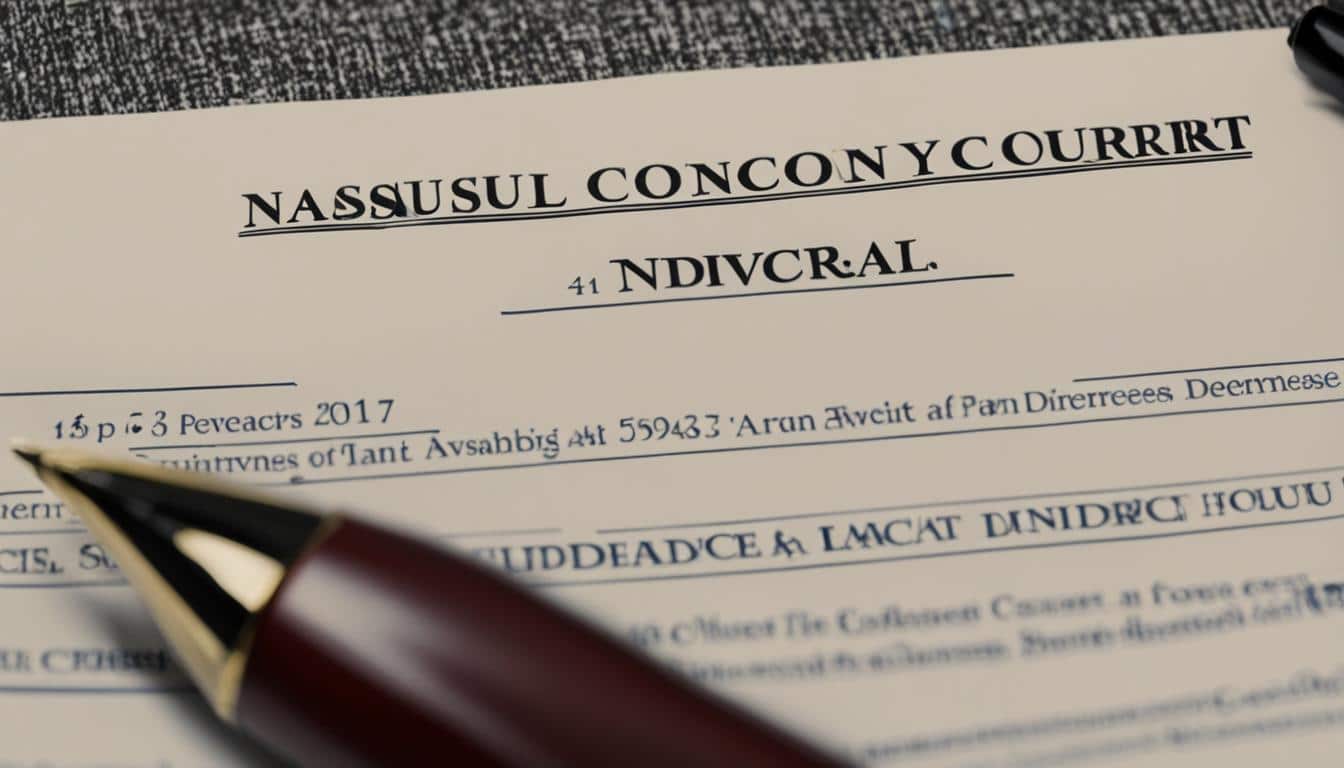Physical Address
304 North Cardinal St.
Dorchester Center, MA 02124
Physical Address
304 North Cardinal St.
Dorchester Center, MA 02124

Filing for divorce in Nassau County, NY, can feel like a journey through uncharted territory. You’re stepping into a world of legal procedures and emotional challenges.
It’s more than just paperwork; it’s a significant life change. Imagine standing at a crossroads, where one path leads to a new chapter in your life. This journey requires guidance, especially in a place like Nassau with its unique legal landscape.

Here, the divorce process comes with its own set of complexities. Understanding residency requirements, navigating local court systems, and deciphering legal jargon are just the beginning.
We’re here to illuminate the path, offering insights specific to Nassau County. Think of this as your personal guide, turning a complicated process into a clear, step-by-step journey.
Eager to learn the secrets of a smoother divorce process? Keep reading as we delve into the essentials, making each step manageable. Let’s walk this path together, towards clarity and a new beginning.
To get more info on filing for divorce in New York, find a detailed overview in our article, How to File for Divorce in New York.
If you are considering filing for divorce in Nassau County, NY, you have to meet the eligibility requirements. To proceed with a divorce in the county, you need to meet certain criteria established by the law.
These requirements encompass residency and other factors that determine your eligibility to file for divorce.
In order to file for divorce in Nassau County, you must meet the residency requirements set by the New York state law. These requirements include:
In addition to the residency requirements, there may be other factors that determine your eligibility to file for divorce in Nassau County.
These factors can include:
If you meet the residency requirements and any other criteria set by the law, you are eligible to file for divorce in Nassau County, NY.
In Nassau, there are various grounds for divorce that individuals can cite when filing for divorce. Understanding these grounds is essential, as they may impact the divorce process and the outcome of the case.
There are two main types of divorce grounds: fault-based divorce and no-fault divorce.
Fault-based divorce is based on specific reasons that demonstrate one spouse’s misconduct. Some common grounds for fault-based divorce include:
Filing for a fault-based divorce requires providing evidence to support these allegations and proving that the misconduct has had a significant impact on the marital relationship.
No-fault divorce, on the other hand, does not require proving any specific misconduct. The main ground for a no-fault divorce is the “irretrievable breakdown of the marital relationship for six months or more.”
A no-fault divorce is often the preferred option as it avoids the need to place blame on one spouse and can lead to a smoother and less contentious divorce process.
The specific grounds for divorce and their legal implications may vary depending on the jurisdiction and the specific circumstances of the case.
Consulting with a qualified divorce attorney who specializes in Nassau cases can provide personalized guidance on the grounds for divorce and their potential impact on your case.

If you have decided to file for divorce, let’s cover the necessary steps involved in the process. By following these steps, you can ensure that your divorce proceedings go smoothly and efficiently.
Filing for divorce in Nassau County can be complex, but by following these steps, you can navigate the process with confidence. Remember to consult with an attorney or seek legal advice if you have any specific questions or concerns about your divorce case.
In order to file for a divorce, there are certain filing fees that you will need to be aware of. These fees cover the cost of processing your divorce case in the county court system.
The cost of filing for divorce in Nassau County generally includes the following:
If you are unable to afford the filing fees for your divorce, you have the option to apply for a fee waiver. A fee waiver allows individuals to proceed with their divorce filing without having to pay the usual fees associated with the process.
To be eligible for a fee waiver, you must meet certain criteria set by the Nassau County court. These criteria typically include:
To apply for a fee waiver, you will need to complete an application form provided by the court. This form will require you to provide information about your income, assets, expenses, and financial circumstances.
Once you have filled out the application, you will need to submit it to the court clerk along with any supporting documents that may be required. These documents may include tax returns, pay stubs, bank statements, or proof of public assistance benefits.
After reviewing your application, the court will determine if you meet the eligibility criteria for a fee waiver. If approved, you will be able to proceed with your divorce filing without paying any fees.
The Matrimonial Center is part of the NY State Supreme Court. in Nassau County is where divorce cases are handled. Here is the address and contact information for the court:
Address: 400 County Seat Drive
Mineola, New York 11501
Contact Information:
The Nassau County Supreme Court is open Monday to Friday from 9:00 AM to 5:00 PM. Contact the court or visit their official website for any additional information or changes in operating hours.
Self-representation, also known as a DIY or pro se divorce, allows you to navigate the divorce process on your own. While it may seem overwhelming, with the right information and resources, you can successfully file for divorce without an attorney.
The first step in filing for divorce without an attorney in Nassau County is to educate yourself about the process and familiarize yourself with the necessary forms.
The Nassau County Supreme Court provides online resources where you can access the required divorce forms and instructions. Take the time to carefully review the forms and understand the information you will need to provide.
Next, gather all the necessary documentation to support your divorce case. This may include financial records, property documents, and any relevant agreements or contracts. Organize these documents in a systematic manner, so they are ready to be submitted when required.
Once you have completed the necessary forms and compiled supporting documentation, you will need to submit them to the Nassau County Supreme Court. Pay close attention to the deadlines and filing instructions specified by the court. It is advisable to make copies of all the submitted documents for your records.
To see how this process of filing for divorce in Nassau County compares to that in other [state] counties, check out our articles about how to file for divorce in Monroe County NY and filing for divorce in Onondaga County NY.